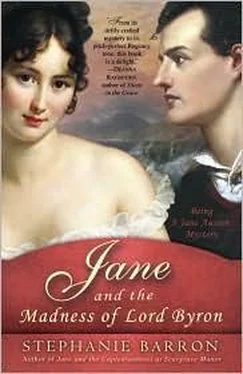“ Your unguarded tongue, ” Mona repeated, all anxious concern. “What can you possibly have said, Morley, to bring such guilt upon your head?”
“I told his lordship too fully, and too freely, what I thought of his manners in abducting my Catherine.”
“His lordship being—Byron?”
The Captain nodded. “I upbraided him at Monday’s Assembly. I was careful throughout the whole to suggest only the indignation of a gentleman , rather than of Catherine’s betrothed, lest I betray too great a partiality. I informed him that by making a sport of Catherine’s virtue, he had exposed her to all the burden of her father’s anger—and that the General’s rage had undoubtedly found expression in physical abuse. In short, I accused Byron of blind selfishness, that had occasioned harm to the very being he professed to love. I believe that I so shamed him—and that, in publick—that he found Catherine in her way home from the Pavilion, and—”
“Killed her.”
His hands must have clenched on his mount’s reins, for the horse jibed.
“You do not credit Mr. Scrope Davies’s assertion, then, that Byron was with him the remainder of that night?” I said nothing of Caro Lamb.
“Davies is Byron’s friend,” Morley said simply.
“You believe all this,” Mona cried, “and yet may play at cards with his lordship? I will never understand the code of gentlemen. Never!”
“I have no proof, and the coroner had effectively acquitted Byron. When I learnt the inquest verdict, I was beside myself—and might have called him out, then and there. But my family has a wretched history where private vengeance is concerned,” he said, with a faint smile.
Point to the Captain , I thought ruefully; his performance was exceedingly well done.
“I chose to shadow Byron,” he continued, “in order to engage him in conversation when I might, over cards or a glass of claret—in the hope that he might betray himself, so that I could then lay information before the magistrate. But happily, Sir Harding Cross arrived at his determination before I was required to act.”
“It is so difficult to untangle the events of that evening.” I sighed. “I was not in attendance at the Assembly myself; but I had heard that the principal actors came and went at such confusing times! Byron quitting the Rooms as Lady Caroline Lamb entered them; Lady Caro quitting them in company with Miss Twining; and the General, who was said to be so jealous of his daughter’s virtue, departing hours before she did! Do you not think it odd, Captain, that so scrupulous a parent should have left his daughter alone at a ball where two men he despised—Lord Byron and yourself—should be paying her marked attention?”
This was plain speaking indeed.
“I should, had I not learnt the cause of the General’s early departure within minutes of leaving the Assembly myself,” the Captain answered calmly. “He had been invited, as I was, to drink Port and play at hazard with Colonel George Hanger, at the Pavilion.”
“With Colonel Hanger!” I glanced at Mona in surprize and consternation, and saw the same mirrored in her looks. “But the General claimed to have gone home that night!”
“It is possible he did not wish to admit of an acquaintance with Hanger, particularly in the company of Mr. Hendred Smalls,” Morley said drily. “But it is common knowledge within the 10th that Hanger and the General—who was but Major Twining then—served together years ago, during the rebellion of the American colonies. Indeed, Hanger was Twining’s second, in the duel that forever divided our two families.”
“Then what were you about, in Heaven’s name, drinking Port with the pair of them?” Mona demanded, scandalised.
The Captain’s mouth curled. “Hanger remains a senior officer, Countess. A fellow in my position does not idly ignore such invitations—which must be received uncommonly like orders.”
“At what time did you join Colonel Hanger?” I recollected that the undergroom, Jem, had received Hanger’s sodden visitation at about half-past two o’clock in the morning.
“I reached the Pavilion when Miss Twining did,” he replied without reservation. “Indeed, I waited until she had quitted the Assembly with Lady Caroline—and then followed, by prior agreement. I escorted the ladies across the Steyne, and parted from them in the front entry. I was shown to Hanger’s rooms, and found General Twining already established in a chair. He did not remain above a half-hour, however, having already been at Hanger’s mercy some time; he stayed only long enough to twit me on my parentage and family history, with undisguised contempt; to belittle Wellington and all our efforts in the Peninsula; and to speak with indescribable bitterness of the loss of his son, and the unusual survival of others—meaning myself, of course, whom he should have preferred dead. I might have said such words to him then as should have justified him in calling me out—for a Captain offers a General disrespect at his peril, you know. But I thought of my friend Richard—and more of my beloved Catherine—and kept a still tongue in my head.”
“And so, by your calculation, the General left you at half-past one?”
“Or a little earlier, perhaps. I did not linger alone with Colonel Hanger long. The General was no sooner out the door, than Hanger must be abusing him—and all his family. The affair of the duel was dragged forward, with Hanger describing the morals of Catherine’s mother in such terms as I should blush to repeat; and then—” Morley hesitated, his blue eyes flicking to meet mine, and a dull red colour suffusing his cheeks—“went so far as to drag Catherine herself through the muck.”
The charger’s head jerked back; the Captain had clenched unconsciously at the reins. “He knew of Byron’s persistent suit—knew, as well, of the attempted abduction, I know not how. His contempt for Byron was immense; he seems to regard all poets as weaklings and—forgive me—sodomites; the fact of Byron’s lameness only inflamed his derision further. I did not waste my words in defending a man I regarded as my enemy; but Catherine—Hanger seemed to believe that Miss Twining encouraged Byron’s attentions—that like her mother, she was, as Colonel Hanger put it, soiled goods , no better than a common doxy, not worth the bullet fired to defend her honour. ”
Mona uttered a shocked exclamation of sympathy.
“You may imagine how I felt,” Morley said in a low voice. “Indignation—outrage—on the point of personal honour, and family pride—Had he been anyone but a senior officer, I should have thrown my glove in his face. As it was—I bade him goodnight with the barest civility and showed myself out of the old blackguard’s rooms.
“I loitered in the Pavilion’s foyer a moment, in the hope that Catherine might descend, and require an escort home. I wish to God I had waited longer! I must have missed her only by moments.”
The Pavilion footman responsible for the door that evening should of course corroborate this, did we ask.
“But Catherine did not appear, and I had no business disturbing Lady Caroline. I recollected I was expected on the Parade Ground to train some raw recruits early the next morning, and slipped regretfully out the door. The stable clock had just finished tolling the half-hour.”
“And General Twining was nowhere in sight?”
Morley hesitated, then continued with marked distaste. “In fact, he had lain in wait for me, if you will credit it. He stepped forward out of the shadows and offered me such abuse—the sort of violent obscenities only a man in his cups should utter—that I so far forgot myself, as to knock him down. No doubt that was his very object, that he might have the pleasure of calling me up before a court-martial.”
Читать дальше












